2019年专业英语八级改错专项练习试题及答案3
- 格式:docx
- 大小:37.24 KB
- 文档页数:2
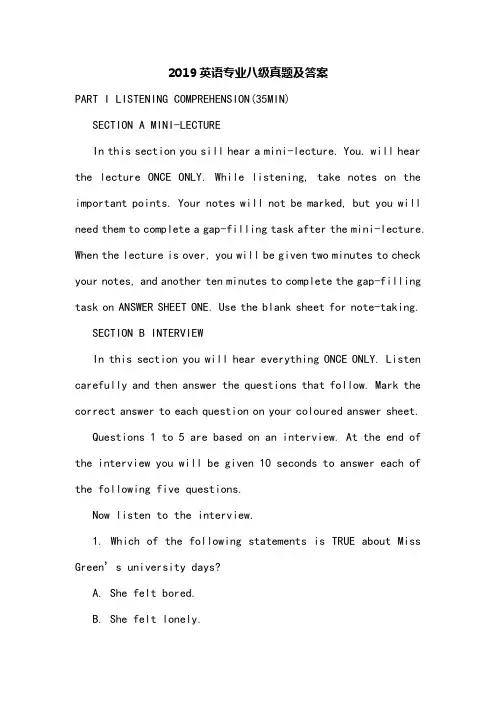
2019英语专业八级真题及答案PART I LISTENING COMPREHENSION(35MIN)SECTION A MINI-LECTUREIn this section you sill hear a mini-lecture. You. will hear the lecture ONCE ONLY. While listening, take notes on the important points. Your notes will not be marked, but you will need them to complete a gap-filling task after the mini-lecture. When the lecture is over, you will be given two minutes to check your notes, and another ten minutes to complete the gap-filling task on ANSWER SHEET ONE. Use the blank sheet for note-taking. SECTION B INTERVIEWIn this section you will hear everything ONCE ONLY. Listen carefully and then answer the questions that follow. Mark the correct answer to each question on your coloured answer sheet. Questions 1 to 5 are based on an interview. At the end of the interview you will be given 10 seconds to answer each of the following five questions.Now listen to the interview.1. Which of the following statements is TRUE about Miss Green’s university days?A. She felt bored.B. She felt lonely.C. She cherished them.D. The subject was easy.2. Which of the following is NOT part of her job with the Department of Employment?A. Doing surveys at workplace.B. Analyzing survey results.C. Designing questionnaires.D. Taking a psychology course.3. According to Miss Green, the main difference between the Department of Employment and the advertising agency lies inA. the nature of work.B. office decoration.C. office location.D. work procedures.4. Why did Miss green want to leave the advertising agency?A. She felt unhappy inside the company.B. She felt work there too demanding.C. She was denied promotion in the company.D. She longed for new opportunities.5. How did Miss Green react to a heavier workload in the new job?A. She was willing and ready.B. She sounded mildly eager.C. She a bit surprised.D. She sounded very reluctant.SECTION C NEWS BROADCASTIn this section you will hear everything ONCE ONLY. Listen carefully and then answer the questions that follow. Mark the correct answer to each question on your coloured answer sheet. Questions 6 and 7 based on the following news. At the end of the news item, you will be given 10 seconds to answer each of the two questions.Now listen to the news.6. The man stole the aircraft mainly because he wanted toA. destroy the European Central Bank.B. have an interview with a TV station.C. circle skyscrapers in downtown Frankfurt.D. remember the death of a US astronaut.7. Which of the following statements about the man is TRUE?A. He was a 31-year-old student from Frankfurt.B. He was piloting a two-seat helicopter he had stolen.C. He had talked to air traffic controllers by radio.D. He threatened to land on the European Central Bank.Question 8 is based on the following news. At the end of thenews item, you will be given 10 seconds to answer the question. Now listen to the news.8. The news is mainly about the city government’s plan toA. expand and improve the existing subway system.B. build underground malls and parking lots.C. prevent further land subsidence.D. promote advanced technology.Questions 9 and 10 are based on the following news. At the end of the news item, you will be given 10 seconds to answer each of the two questions.Now listen to the news.9. According to the news, what makes this credit card different from conventional ones isA. that it can hear the owner’s voice.B. that it can remember a password.C. that it can identify the owner’s voice.D. that it can remember the owner’s PIN.10. The newly developed credit card is said to said to have all the following EXCEPTA. switch.B. battery.C. speaker.D. built-in chip.参考答案:Section A Mini-lecture1.the author2.other works3.literary trends4.grammar,diction or uses of image5.cultural codes6.cultural7.the reader8.social9.reader competency10. social sructure,traditions of writing or political cultural influences,etc.Section B Interview1-5 CDDDASection C News Broadcast6-10 DCBCAPART II READING COMPREHENSION(30MIN)In this section there are four reading passages followed by a total of 20 multiple-choice questions.Read the passages and then mark your answers on your colouredanswer sheet.TEXT AThe University in transformation, edited by Australian futurists Sohail Inayatullah and Jennifer Gidley, presents some 20 highly varied outlooks on tomorrow’s universities by writers representing both Western and mon-Western perspectives. Their essays raise a broad range of issues, questioning nearly every key assumption we have about higher education today.The most widely discussed alternative to the traditional campus is the Internet University - a voluntary community to scholars/teachers physically scattered throughout a country or around the world but all linked in cyberspace. A computerized university could have many advantages, such as easy scheduling, efficient delivery of lectures to thousands or even millions of students at once, and ready access for students everywhere to the resources of all the world’s great libraries.Yet the Internet University poses dangers, too. For example, a line of franchised courseware, produced by a few superstar teachers, marketed under the brand name of a famous institution, and heavily advertised, might eventually come to dominate the global education market, warns sociology professor Peter Manicas of the University of Hawaii at Manoa. Besides enforcinga rigidly standardized curriculum, such a “college education in a box” could undersell the offerings of many traditional brick and mortar institutions, effectively driving then out of business and throwing thousands of career academics out of work, note Australian communications professors David Rooney and Greg Hearn.On the other hand, while global connectivity seems highly likely to play some significant role in future higher education, that does not mean greater uniformity in course content - or other dangers - will necessarily follow. Counter-movements are also at work.Many in academia, including scholars contributing to this volume, are questioning the fundamental mission of university education. What if, for instance, instead of receiving primarily technical training and building their individual careers, university students and professors could focus their learning and research efforts on existing problems in their local communities and the world? Feminist scholar Ivana Milojevic dares to dream what a university might become “if we believed that child-care workers and teachers in early childhood education should be one of the highest (rather than lowest) paid professionals?”Co-editor Jennifer Gidley shows how tomorrow’s university faculty, instead of giving lectures and conducting independent research, may take on three new roles. Some would act as brokers, assembling customized degree-credit programmes for individual students by mixing and matching the best course offerings available from institutions all around the world. A second group, mentors, would function much like today’s faculty advisers, but are likely to be working with many more students outside their own academic specialty. This would require them to constantly be learning from their students as well as instructing them.A third new role for faculty, and in Gidley’s view the most challenging and rewarding of all, would be as meaning-makers: charismatic sages and practitioners leading groups of students/colleagues in collaborative efforts to find spiritual as well as rational and technological solutions to specific real-world problems.Moreover, there seems little reason to suppose that any one form of university must necessarily drive out all other options. Students may be “enrolled” in courses offered at virtual campuses on the Internet, between -or even during - sessions at a real-world problem-focused institution.As co-editor Sohail Inayatullah points out in his introduction, no future is inevitable, and the very act of imagining and thinking through alternative possibilities can directly affect how thoughtfully, creatively and urgently even a dominant technology is adapted and applied. Even in academia, the future belongs to those who care enough to work their visions into practical, sustainable realities.11. When the book reviewer discusses the Internet University,A. he is in favour of it.B. his view is balanced.C. he is slightly critical of it.D. he is strongly critical of it.12. Which of the following is NOT seen as a potential danger of the Internet University?A. Internet-based courses may be less costly than traditional ones.B. Teachers in traditional institutions may lose their jobs.C. internet-based courseware may lack variety in course content.D. The Internet University may produce teachers with a lot of publicity.13. According to the review, what is the fundamental mission of traditional university education?A. Knowledge learning and career building.B. Learning how to solve existing social problems.C. Researching into solutions to current world problems.D. Combining research efforts of teachers and students in learning.14. Judging from the Three new roles envisioned for tomorrow’s university faculty, university teachersA, are required to conduct more independent research.B. are required to offer more course to their students……C. are supposed to assume more demanding duties.D. are supposed to supervise more students in their specialty.15. Which category of writing does the review belong to?A. Narration.B. DescriptionC. persuasionD. Exposition.TEXT BEvery street had a story, every building a memory, Those blessed with wonderful childhoods can drive the streets oftheir hometowns and happily roll back the years. The rest are pulled home by duty and leave as soon as possible. After Ray Atlee had been in Clanton (his hometown) for fifteen minutes he was anxious to get out.The town had changed, but then it hadn’t. On the highways leading in, the cheap metal buildings and mobile homes were gathering as tightly as possible next to the roads for maximum visibility. This town had no zoning whatsoever. A landowner could build anything wiih no permit no inspection, no notice to adjoining landowners. nothing. Only hog farms and nuclear reactors required approvals and paperwork. The result was a slash-and-build clutter that got uglier by the year.But in the older sections, nearer the square, the town had not changed at all The long shaded streets were as clean and neat as when Kay roamed them on his bike. Most of the houses were still owned by people he knew, or if those folks had passed on the new owners kept the lawns clipped and the shutters painted. Only a few were being neglected. A handful had been abandoned.This deep in Bible country, it was still an unwritten rule in the town that little was done on Sundays except go to church, sit on porches, visit neighbours, rest and relax the way Godintended.It was cloudy, quite cool for May, and as he toured his old turf, killing time until the appointed hour for the family meeting, he tried to dwell on the good memories from Clanton. There was Dizzy Dean Park where he had played little League for the Pirates, and (here was the public pool he’d swum in every summer except 1969 when the city closed it rather than admit black children. There were the churches - Baptist, Methodist, and Presbyterian - facing each other at the intersection of Second and Elm like wary sentries, their steeples competing for height. They were empty now, hut in an hour or so the more faithful would gather for evening services.The square was as lifeless as the streets leading to it. With eight thousand people, Clanton was just large enough to have attracted the discount stores that had wiped out so many small towns. But here the people had been faithful to their downtown merchants, and there wasn’t s single empty or boarded-up building around the square - no small miracle. The retail shops were mixed in with the banks and law offices and cafes, all closed for the Sabbath.He inched through the cemetery and surveyed the Atlee section in the old part, where the tombstones were grander. Someof his ancestors had built monuments for their dead. Ray had always assumed that the family money he’d never seen must have been buried in those graves. He parked and walked to his mother’s grave, something he hadn’t done in years. She was buried among the Atlees, at the far edge of the family plot because she had barely belonged.Soon, in less than an hour, he would be sitting in his father’s study, sipping bad instant tea and receiving instructions on exactly how his father would be laid to rest. Many orders were about to be give, many decrees and directions, because his father(who used to be a judge) was a great man and cared deeply about how he was to be remembered.Moving again, Ray passed the water tower he’d climbed twice, the second time with the police waiting below. He grimaced at his old high school, a place he’d never visited since he’d left it. Behind it was the football field where his brother Forrest had romped over opponents and almost became famous before getting bounced off the team.It was twenty minutes before five, Sunday, May 7. Time for the family meeting.16. From the first paragraph, we get the impression thatA. Ray cherished his childhood memories.B. Ray had something urgent to take care of.C. Ray may not have a happy childhood.D. Ray cannot remember his childhood days.17. Which of the following adjectives does NOT describe Ray’s hometown?A. Lifeless.B. Religious.C. Traditional.D. Quiet.18. Form the passage we can infer that the relationship between Ray and his parents wasA. close.B. remote.C. tense.D. impossible to tell.19. It can be inferred from the passage that Ray’s father was all EXCEPTA. considerate.B. punctual.C. thrifty.D. dominant.TEXT CCampaigning on the Indian frontier is an experience by itself. Neither the landscape nor the people find their counterparts in any other portion of the globe. Valley walls rise steeply five or six thousand feet on every side. The columns crawl through a maze of giant corridors down which fierce snow-fed torrents foam under skies of brass. Amid these scenes of savage brilliancy there dwells a race whose qualities seem to harmonize with their environment. Except at harvest-time, when self-preservation requires a temporary truce, the Pathan tribes are always engaged in private or public war. Every man is a warrior, a politician and a theologian. Every large house is a real feudal fortress made, it is true, only of sun-baked clay, but with battlements, turrets, loopholes, drawbridges, etc. complete. Every village has its defence. Every family cultivates its vendetta; every clan, its feud. The numerous tribes and combinations of tribes all have their accounts to settle with one another. Nothing is ever forgotten, and very few debts are left unpaid. For the purposes of social life, in addition to the convention about harvest-time, a most elaborate code of honour has been established and is on the whole faithfully observed. A man who knew it and observed it faultlessly might pass unarmed from oneend of the frontier to another. The slightest technical slip would, however, be fatal. The life of the Pathan is thus full of interest; and his valleys, nourished alike by endless sunshine and abundant water, are fertile enough to yield with little labour the modest material requirements of a sparse population.Into this happy world the nineteenth century brought two new facts: the rifle and the British Government. The first was an enormous luxury and blessing; the second, an unmitigated nuisance. The convenience of the rifle was nowhere more appreciated than in the Indian highlands. A weapon which would kill with accuracy at fifteen hundred yards opened a whole new vista of delights to every family or clan which could acquire it. One could actually remain in one’s own house and fire at one’s neighbour nearly a mile away. One could lie in wait on some high crag, and at hitherto unheard-of ranges hit a horseman far below. Even villages could fire at each other without the trouble of going far from home. Fabulous prices were therefore offered for these glorious products of science. Rifle-thieves scoured all India to reinforce the efforts of the honest smuggler. A steady flow of the coveted weapons spread its genial influence throughout the frontier, and the respect which thePathan tribesmen entertained for Christian civilization was vastly enhanced.The action of the British Government on the other hand was entirely unsatisfactory. The great organizing, advancing, absorbing power to the southward seemed to be little better than a monstrous spoil-sport. If the Pathan made forays into the plains, not only were they driven back (which after all was no more than fair), but a whole series of subsequent interferences took place, followed at intervals by expeditions which toiled laboriously through the valleys, scolding the tribesmen and exacting fines for any damage which they had done. No one would have minded these expeditions if they had simply come, had a fight and then gone away again. In many cases this was their practice under what was called the “butcher and bolt policy”to which the Government of India long adhered. But towards the end of the nineteenth century these intruders began to make roads through many of the valleys, and in particular the great road to Chitral. They sought to ensure the safety of these roads by threats, by forts and by subsidies. There was no objection to the last method so far as it went. But the whole of this tendency to road-making was regarded by the Pathans with profound distaste. All along the road people were expected tokeep quiet, not to shoot one another, and above all not to shoot at travellers along the road. It was too much to ask, and a whole series of quarrels took their origin from this source.20. The word debts in “very few debts are left unpaid” in the first paragraph meansA. loans. B. accounts C.killings D.bargains.21. Which of the following is NOT one of the geographical facts about the Indian frontier?A. Melting snows.B. Large population.C. Steep hillsides.D. Fertile valleys.22. According to the passage, the Pathans welcomedA. the introduction of the rifle.B. the spread of British rule.C. the extension of luxuriesD. the spread of trade.23. Building roads by the BritishA. put an end to a whole series of quarrels.B. prevented the Pathans from earning on feuds.C. lessened the subsidies paid to the Pathans.D. gave the Pathans a much quieter life.24. A suitable title for the passage would beA. Campaigning on the Indian frontier.B. Why the Pathans resented the British rule.C. The popularity of rifles among the Pathans.D. The Pathans at war.TEXT D“Museum” is a slippery word. It first meant (in Greek) anything consecrated to the Muses: a hill, a shrine, a garden, a festival or even a textbook. Both Plato’s Academy and Aristotle’s Lyceum had a mouseion, a muses’ shrine. Although the Greeks already collected detached works of art, many temples - notably that of Hera at Olympia (before which the Olympic flame is still lit) - had collections of objects, some of which were works of art by well-known masters, while paintings and sculptures in the Alexandrian Museum were incidental to its main purpose.The Romans also collected and exhibited art from disbanded temples, as well as mineral specimens, exotic plants, animals; and they plundered sculptures and paintings (mostly Greek) for exhibition. Meanwhile, the Greek word had slipped into Latin by transliteration (though not to signify picture galleries, which were called pinacothecae) and museum still more or less meant “Muses’ shrine”.The inspirational collections of precious and semi-preciousobjects were kept in larger churches and monasteries - which focused on the gold-enshrined, bejewelled relics of saints and martyrs. Princes, and later merchants, had similar collections, which became the deposits of natural curiosities: large lumps of amber or coral, irregular pearls, unicorn horns, ostrich eggs, fossil bones and so on. They also included coins and gems - often antique engraved ones - as well as, increasingly, paintings and sculptures. As they multiplied and expanded, to supplement them, the skill of the fakers grew increasingly refined.At the same time, visitors could admire the very grandest paintings and sculptures in the churches, palaces and castles; they were not “collected” either, but “site-specific”, and were considered an integral part both of the fabric of the buildings and of the way of life which went on inside them - and most of the buildings were public ones. However, during the revival of antiquity in the fifteenth century, fragments of antique sculpture were given higher status than the work of any contemporary, so that displays of antiquities would inspire artists to imitation, or even better, to emulation; and so could be considered Muses’ shrines in the former sense. The Medici garden near San Marco in Florence, the Belvedere and the Capitolin Rome were the most famous of such early “inspirational”collections. Soon they multiplied, and, gradually, exemplary “modern” works wereIn the seventeenth century, scientific and prestige collecting became so widespread that three or four collectors independently published directories to museums all over the known world. But it was the age of revolutions and industry which produced the next sharp shift in the way the institution was perceived: the fury against royal and church monuments prompted antiquarians to shelter them in asylum-galleries, of which the Musee des Monuments Francais was the most famous. Then, in the first half of the nineteenth century, museum funding took off, allied to the rise of new wealth: London acquired the National Gallery and the British Museum, the Louvre was organized, the Museum-Insel was begun in Berlin, and the Munich galleries were built. In Vienna, the huge Kunsthistorisches and Naturhistorisches Museums took over much of the imperial treasure. Meanwhile, the decline of craftsmanship (and of public taste with it) inspired the creation of “improving”collections. The Victoria and Albert Museum in London was the most famous, as well as perhaps the largest of them.25.The sentence “Museum is a slippery word” in the firstparagraph means thatA. the meaning of the word didn’t change until after the 15th century.B. the meaning of the word had changed over the years.C. the Greeks held different concepts from the Romans.D. princes and merchants added paintings to their collections.26.The idea that museum could mean a mountain or an object originates fromA. the Romans.B. Florence.C. Olympia.D. Greek.27. “……the skill of the fakers grew increasingly refined” in the third paragraph means thatA. there was a great demand for fakers.B. fakers grew rapidly in number.C. fakers became more skillful.D. fakers became more polite.28. Painting and sculptures on display in churches in the 15th century wereA. collected from elsewhere.B. made part of the buildings.C. donated by people.D. bought by churches.29. Modern museums came into existence in order toA. protect royal and church treasures.B. improve existing collections.C. stimulate public interest.D. raise more funds.30. Which is the main idea of the passage?A. Collection and collectors.B. The evolution of museums.C. Modern museums and their functions.D. The birth of museums.11-15 BAACD 16-20 CDBAC 21-25BABAB 26-30 DCBABPART III. 人文知识There are ten multiple-choice questions in this section.Choose the best answers to each question.Mark your answers on your coloured answer sheet.31.The Presidents during the American Civil War wasA. Andrew JacksonB. Abraham LincolnC. Thomas JeffersonD. George Washington32.The capital of New Zealand isA.ChristchurchB.AucklandC.WellingtonD.Hamilton33.Who were the natives of Austrilia before the arrival of the British settlers?A.The AboriginesB.The MaoriC.The IndiansD.The Eskimos34.The Prime Minister in Britain is head ofA.the Shadow CabinetB.the ParliamentC.the OppositionD.the Cabinet35.Which of the following writers is a poet of the 20th century?A.T.S.EliotwrenceC.Theodore DreiserD.James Joyce36.The novel For Whom the Bell Tolls is written byA.Scott FitzgeraldB.William FaulknerC.Eugene O’NeilD.Ernest Hemingway37._____ is defined as an expression of human emotion which is condensed into fourteen linesA.Free verseB.SonnetC.OdeD.Epigram38.What essentially distinguishes semantics and pragmatics is the notion ofA.referenceB.meaningC.antonymyD.context39.The words”kid,child,offspring” are examples ofA.dialectal synonymsB.stylistic synonymsC.emotive synonymsD.collocational synonyms40.The distinction between parole and langue was made byA.HalliayB.ChomskyC.BloomfieldD.Saussure参考答案: 31-35BCADA 36-40 DBDBDPART IV 改错参考答案1. agreeing-agreed2. in which 可有可无3. in his disposal- at his disposal4.enables-enable5.the other English speakers-other English speakers6.old-older7.seen-understood8.take it for granted- take for granted9.or-and10. the most striking of human achievementsV. 汉译英及参考译文中国民族自古以来从不把人看作高于一切,在哲学文艺方面的表现都反映出人在自然界中与万物占着一个比例较为恰当的地位,而非绝对统治万物的主宰。
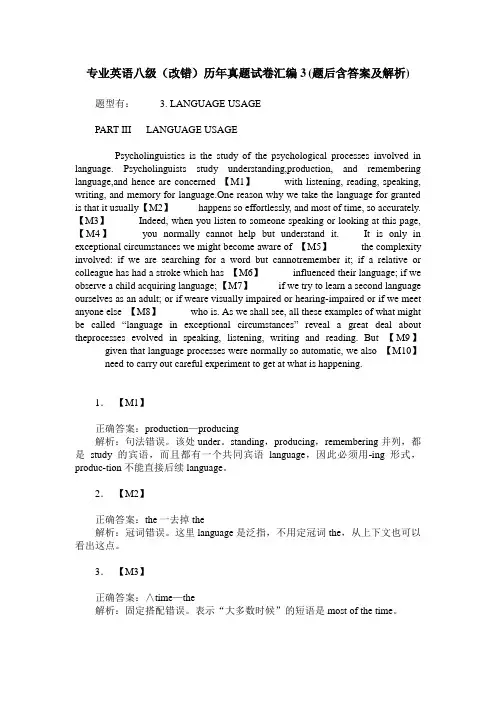
专业英语八级(改错)历年真题试卷汇编3(题后含答案及解析) 题型有: 3. LANGUAGE USAGEPART III LANGUAGE USAGEPsycholinguistics is the study of the psychological processes involved in language. Psycholinguists study understanding,production, and remembering language,and hence are concerned 【M1】______with listening, reading, speaking, writing, and memory for language.One reason why we take the language for granted is that it usually 【M2】______happens so effortlessly, and most of time, so accurately. 【M3】______Indeed, when you listen to someone speaking or looking at this page, 【M4】______you normally cannot help but understand it. It is only in exceptional circumstances we might become aware of 【M5】______the complexity involved: if we are searching for a word but cannotremember it; if a relative or colleague has had a stroke which has 【M6】______influenced their language; if we observe a child acquiring language; 【M7】______if we try to learn a second language ourselves as an adult; or if weare visually impaired or hearing-impaired or if we meet anyone else 【M8】______who is. As we shall see, all these examples of what might be called “language in exceptional circumstances”reveal a great deal about theprocesses evolved in speaking, listening, writing and reading. But 【M9】______given that language processes were normally so automatic, we also 【M10】______need to carry out careful experiment to get at what is happening.1.【M1】正确答案:production—producing解析:句法错误。
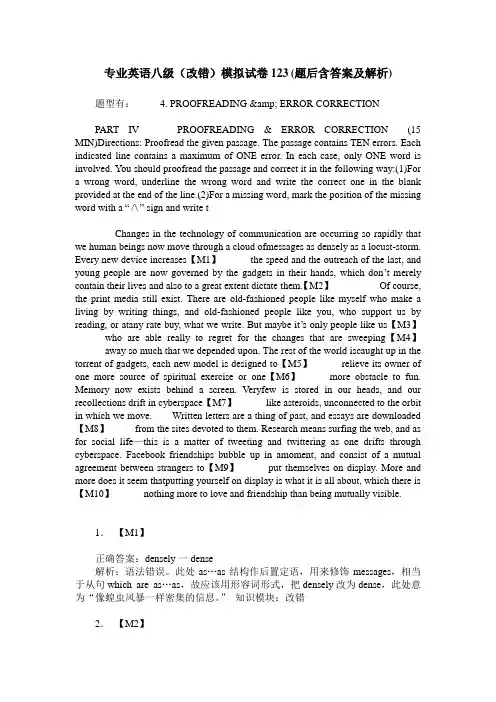
专业英语八级(改错)模拟试卷123(题后含答案及解析)题型有: 4. PROOFREADING & ERROR CORRECTIONPART IV PROOFREADING & ERROR CORRECTION (15 MIN)Directions: Proofread the given passage. The passage contains TEN errors. Each indicated line contains a maximum of ONE error. In each case, only ONE word is involved. You should proofread the passage and correct it in the following way:(1)For a wrong word, underline the wrong word and write the correct one in the blank provided at the end of the line.(2)For a missing word, mark the position of the missing word with a “∧” sign and write tChanges in the technology of communication are occurring so rapidly that we human beings now move through a cloud ofmessages as densely as a locust-storm. Every new device increases【M1】______the speed and the outreach of the last, and young people are now governed by the gadgets in their hands, which don’t merely contain their lives and also to a great extent dictate them.【M2】______ Of course, the print media still exist. There are old-fashioned people like myself who make a living by writing things, and old-fashioned people like you, who support us by reading, or atany rate buy, what we write. But maybe it’s only people like us【M3】______who are able really to regret for the changes that are sweeping【M4】______away so much that we depended upon. The rest of the world iscaught up in the torrent of gadgets, each new model is designed to【M5】______relieve its owner of one more source of spiritual exercise or one【M6】______more obstacle to fun. Memory now exists behind a screen. Veryfew is stored in our heads, and our recollections drift in cyberspace【M7】______like asteroids, unconnected to the orbit in which we move. Written letters are a thing of past, and essays are downloaded 【M8】______from the sites devoted to them. Research means surfing the web, and as for social life—this is a matter of tweeting and twittering as one drifts through cyberspace. Facebook friendships bubble up in amoment, and consist of a mutual agreement between strangers to【M9】______put themselves on display. More and more does it seem thatputting yourself on display is what it is all about, which there is 【M10】______nothing more to love and friendship than being mutually visible.1.【M1】正确答案:densely一dense解析:语法错误。
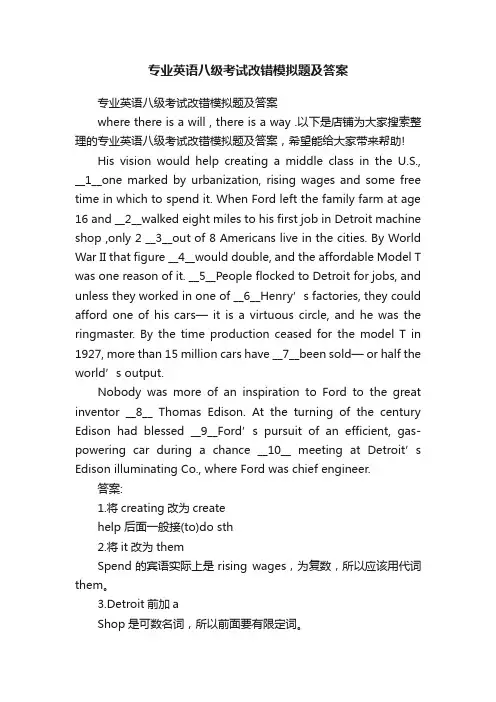
专业英语八级考试改错模拟题及答案专业英语八级考试改错模拟题及答案where there is a will , there is a way .以下是店铺为大家搜索整理的专业英语八级考试改错模拟题及答案,希望能给大家带来帮助!His vision would help creating a middle class in the U.S., __1__one marked by urbanization, rising wages and some free time in which to spend it. When Ford left the family farm at age 16 and __2__walked eight miles to his first job in Detroit machine shop ,only 2 __3__out of 8 Americans live in the cities. By World War II that figure __4__would double, and the affordable Model T was one reason of it. __5__People flocked to Detroit for jobs, and unless they worked in one of __6__Henry’s factories, they could afford one of his cars—it is a virtuous circle, and he was the ringmaster. By the time production ceased for the model T in 1927, more than 15 million cars have __7__been sold— or half the world’s output.Nobody was more of an inspiration to Ford to the great inventor __8__ Thomas Edison. At the turning of the century Ed ison had blessed __9__Ford’s pursuit of an efficient, gas-powering car during a chance __10__ meeting at Detroit’s Edison illuminating Co., where Ford was chief engineer.答案:1.将creating改为createhelp 后面一般接(to)do sth2.将it改为themSpend的宾语实际上是rising wages,为复数,所以应该用代词them。

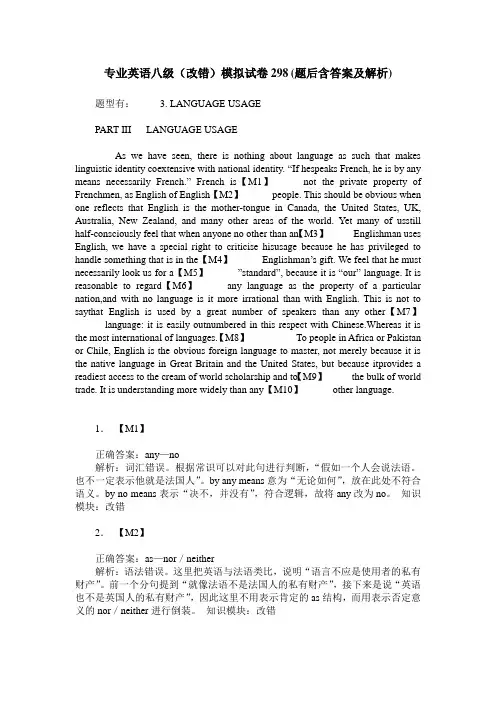
专业英语八级(改错)模拟试卷298(题后含答案及解析)题型有: 3. LANGUAGE USAGEPART III LANGUAGE USAGEAs we have seen, there is nothing about language as such that makes linguistic identity coextensive with national identity. “If hespeaks French, he is by any means necessarily French.”French is【M1】______not the private property of Frenchmen, as English of English【M2】______people. This should be obvious when one reflects that English is the mother-tongue in Canada, the United States, UK, Australia, New Zealand, and many other areas of the world. Yet many of usstill half-consciously feel that when anyone no other than an【M3】______Englishman uses English, we have a special right to criticise hisusage because he has privileged to handle something that is in the【M4】______Englishman’s gift. We feel that he must necessarily look us for a【M5】______”standard”, because it is “our” language. It is reasonable to regard【M6】______any language as the property of a particular nation,and with no language is it more irrational than with English. This is not to saythat English is used by a great number of speakers than any other【M7】______language: it is easily outnumbered in this respect with Chinese.Whereas it is the most international of languages.【M8】______ To people in Africa or Pakistan or Chile, English is the obvious foreign language to master, not merely because it is the native language in Great Britain and the United States, but because itprovides a readiest access to the cream of world scholarship and to【M9】______the bulk of world trade. It is understanding more widely than any【M10】______other language.1.【M1】正确答案:any—no解析:词汇错误。
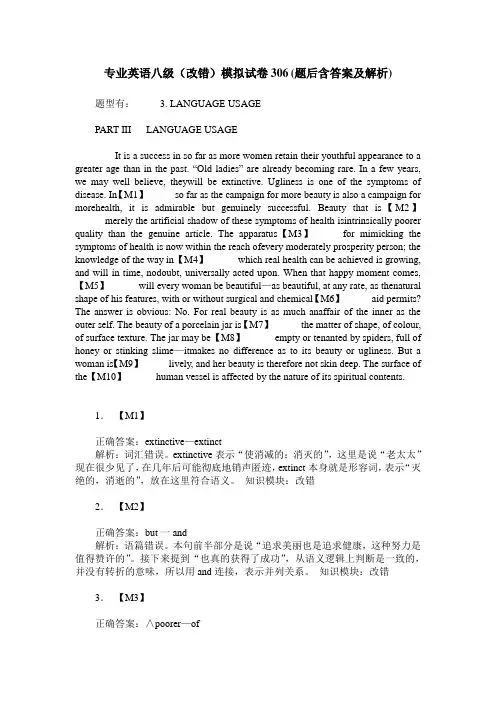
专业英语八级(改错)模拟试卷306(题后含答案及解析)题型有: 3. LANGUAGE USAGEPART III LANGUAGE USAGEIt is a success in so far as more women retain their youthful appearance to a greater age than in the past. “Old ladies” are already becoming rare. In a few years, we may well believe, theywill be extinctive. Ugliness is one of the symptoms of disease. In【M1】______so far as the campaign for more beauty is also a campaign for morehealth, it is admirable but genuinely successful. Beauty that is【M2】______merely the artificial shadow of these symptoms of health isintrinsically poorer quality than the genuine article. The apparatus【M3】______for mimicking the symptoms of health is now within the reach ofevery moderately prosperity person; the knowledge of the way in【M4】______which real health can be achieved is growing, and will in time, nodoubt, universally acted upon. When that happy moment comes,【M5】______will every woman be beautiful—as beautiful, at any rate, as thenatural shape of his features, with or without surgical and chemical【M6】______aid permits? The answer is obvious: No. For real beauty is as much anaffair of the inner as the outer self. The beauty of a porcelain jar is【M7】______the matter of shape, of colour, of surface texture. The jar may be【M8】______empty or tenanted by spiders, full of honey or stinking slime—itmakes no difference as to its beauty or ugliness. But a woman is【M9】______lively, and her beauty is therefore not skin deep. The surface of the【M10】______human vessel is affected by the nature of its spiritual contents.1.【M1】正确答案:extinctive—extinct解析:词汇错误。
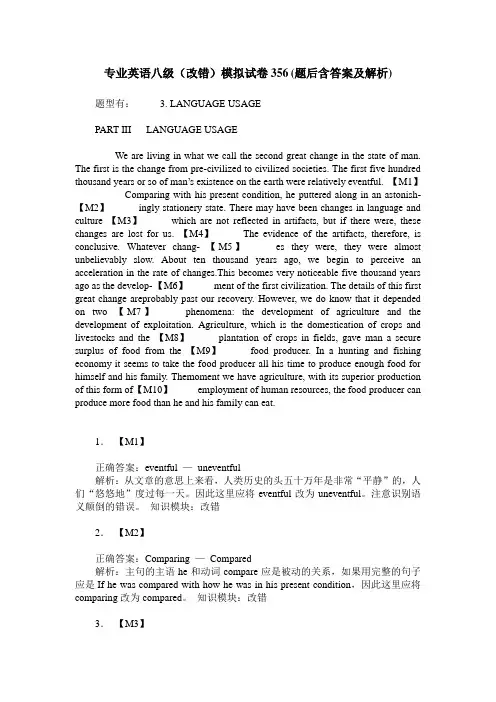
专业英语八级(改错)模拟试卷356(题后含答案及解析)题型有: 3. LANGUAGE USAGEPART III LANGUAGE USAGEWe are living in what we call the second great change in the state of man. The first is the change from pre-civilized to civilized societies. The first five hundred thousand years or so of man’s existence on the earth were relatively eventful. 【M1】______ Comparing with his present condition, he puttered along in an astonish- 【M2】______ingly stationery state. There may have been changes in language and culture 【M3】______which are not reflected in artifacts, but if there were, these changes are lost for us. 【M4】______The evidence of the artifacts, therefore, is conclusive. Whatever chang- 【M5】______es they were, they were almost unbelievably slow. About ten thousand years ago, we begin to perceive an acceleration in the rate of changes.This becomes very noticeable five thousand years ago as the develop- 【M6】______ment of the first civilization. The details of this first great change areprobably past our recovery. However, we do know that it depended on two 【M7】______phenomena: the development of agriculture and the development of exploitation. Agriculture, which is the domestication of crops and livestocks and the 【M8】______plantation of crops in fields, gave man a secure surplus of food from the 【M9】______food producer. In a hunting and fishing economy it seems to take the food producer all his time to produce enough food for himself and his family. Themoment we have agriculture, with its superior production of this form of 【M10】______employment of human resources, the food producer can produce more food than he and his family can eat.1.【M1】正确答案:eventful —uneventful解析:从文章的意思上来看,人类历史的头五十万年是非常“平静”的,人们“悠悠地”度过每一天。
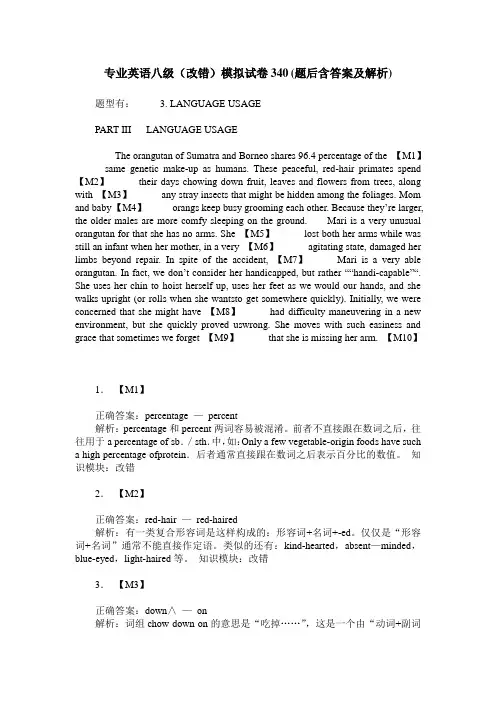
专业英语八级(改错)模拟试卷340(题后含答案及解析)题型有: 3. LANGUAGE USAGEPART III LANGUAGE USAGEThe orangutan of Sumatra and Borneo shares 96.4 percentage of the 【M1】______same genetic make-up as humans. These peaceful, red-hair primates spend 【M2】______their days chowing down fruit, leaves and flowers from trees, along with 【M3】______any stray insects that might be hidden among the foliages. Mom and baby 【M4】______orangs keep busy grooming each other. Because they’re larger, the older males are more comfy sleeping on the ground. Mari is a very unusual orangutan for that she has no arms. She 【M5】______lost both her arms while was still an infant when her mother, in a very 【M6】______agitating state, damaged her limbs beyond repair. In spite of the accident, 【M7】______Mari is a very able orangutan. In fact, we don’t consider her handicapped, but rather ““handi-capable”“. She uses her chin to hoist herself up, uses her feet as we would our hands, and she walks upright (or rolls when she wantsto get somewhere quickly). Initially, we were concerned that she might have 【M8】______had difficulty maneuvering in a new environment, but she quickly proved uswrong. She moves with such easiness and grace that sometimes we forget 【M9】______that she is missing her arm. 【M10】______1.【M1】正确答案:percentage —percent解析:percentage和percent两词容易被混淆。
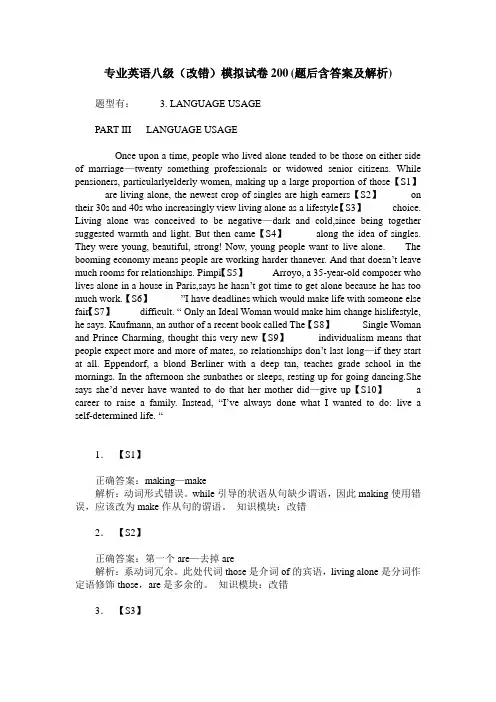
专业英语八级(改错)模拟试卷200(题后含答案及解析)题型有: 3. LANGUAGE USAGEPART III LANGUAGE USAGEOnce upon a time, people who lived alone tended to be those on either side of marriage—twenty something professionals or widowed senior citizens. While pensioners, particularlyelderly women, making up a large proportion of those【S1】______are living alone, the newest crop of singles are high earners【S2】______on their 30s and 40s who increasingly view living alone as a lifestyle【S3】______choice. Living alone was conceived to be negative—dark and cold,since being together suggested warmth and light. But then came【S4】______along the idea of singles. They were young, beautiful, strong! Now, young people want to live alone. The booming economy means people are working harder thanever. And that doesn’t leave much rooms for relationships. Pimpi【S5】______Arroyo, a 35-year-old composer who lives alone in a house in Paris,says he hasn’t got time to get alone because he has too much work.【S6】______”I have deadlines which would make life with someone else fair【S7】______difficult. “ Only an Ideal Woman would make him change hislifestyle, he says. Kaufmann, an author of a recent book called The【S8】______Single Woman and Prince Charming, thought this very new【S9】______individualism means that people expect more and more of mates, so relationships don’t last long—if they start at all. Eppendorf, a blond Berliner with a deep tan, teaches grade school in the mornings. In the afternoon she sunbathes or sleeps, resting up for going dancing.She says she’d never have wanted to do that her mother did—give up【S10】______a career to raise a family. Instead, “I’ve always done what I wanted to do: live a self-determined life. “1.【S1】正确答案:making—make解析:动词形式错误。
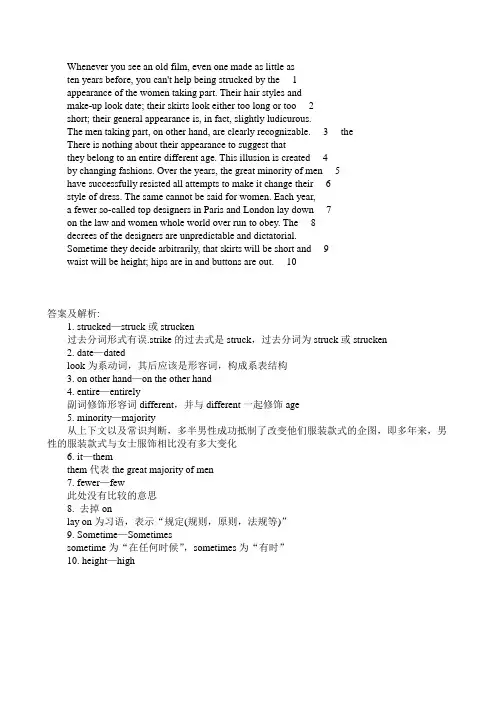
Whenever you see an old film, even one made as little asten years before, you can't help being strucked by the __1__appearance of the women taking part. Their hair styles andmake-up look date; their skirts look either too long or too __2__short; their general appearance is, in fact, slightly ludicurous.The men taking part, on other hand, are clearly recognizable. __3__ theThere is nothing about their appearance to suggest thatthey belong to an entire different age. This illusion is created __4__by changing fashions. Over the years, the great minority of men __5__have successfully resisted all attempts to make it change their __6__style of dress. The same cannot be said for women. Each year,a fewer so-called top designers in Paris and London lay down __7__on the law and women whole world over run to obey. The __8__decrees of the designers are unpredictable and dictatorial.Sometime they decide arbitrarily, that skirts will be short and __9__waist will be height; hips are in and buttons are out. __10__答案及解析:1. strucked—struck或strucken过去分词形式有误.strike的过去式是struck,过去分词为struck或strucken2. date—datedlook为系动词,其后应该是形容词,构成系表结构3. on other hand—on the other hand4. entire—entirely副词修饰形容词different,并与different一起修饰age5. minority—majority从上下文以及常识判断,多半男性成功抵制了改变他们服装款式的企图,即多年来,男性的服装款式与女士服饰相比没有多大变化6. it—themthem代表the great majority of men7. fewer—few此处没有比较的意思8. 去掉onlay on为习语,表示“规定(规则,原则,法规等)”9. Sometime—Sometimessometime为“在任何时候”,sometimes为“有时”10. height—highThe tendency nowadays to wander in wildernesses is delightfulto see. Thousands of tired, nerve-shaking, over-civilized people are __1__nerve-shakenbeginning to find out that going to mountains is going home; that wildness is anecessity; and mountain parks and reservations are __2__thatuseful not only as fountains of timber and irrigating rivers, and as __3__butfountains of life. Awakening from the stupefying effects of thevicious of over-industry and the deadly apathy of luxury, they are __4__trying as best they can to mix and enrich their own little ongoingswith that of Nature, and to get rid of rust and disease. Briskly __5__venturing and roaming, some are washing off sins and cares of thedevil's spinning in storms on mountains, bending down and partingsweet, flowery sprays; tracing rivers back their sources, getting in __6__touch with the nerves of Mother Earth; jumping from rock to rock, panting inwhole-souled exercise, and rejoicing in deep, long-drawnbreathes of pure wildness. This is fine and natural and full of promise. __7__breathsSo also was the growing interest in the care and preservation of __8__ isforests and wild places in general, and in the half wild parks and gardens oftowns. Even the scenery exists in its most artificial forms, mixed withspectacles, silliness, and kodaks; its devoteesarrayed more gorgeously than scarlet tanagers, frightening the wild game __9__with red umbrellas,--even this is encouraging, and may well beregarded as a hopeful sign of the times. __10__答案及解析:1.nerve-shaking--nerve-shaken句中用的是shake“动摇(信心,信念)”这一意义,而作为这个意思是,shake是及物动词,例如:She was shaken by the crisis。
专业英语八级(改错)历年真题试卷汇编4(题后含答案及解析) 题型有: 3. LANGUAGE USAGEPART III LANGUAGE USAGEWhen I was in my early teens, I was taken to a spectacular showon ice by the mother of a friend. Looked round at the luxury of the【M1】______rink, my friend’s mother remarked on the “plush” seats we had beengiven. I did not know what she meant, and being proud of my【M2】______vocabulary, I tried to infer its meaning from the context. “Plush”wasclearly intended as a complimentary, a positive evaluation: that much I【M3】______could tell it from the tone of voice and the context. So I started to use【M4】______the word. Yes, I replied, they certainly are plush, and so are the ice rink and the costumes of the skaters, aren’t they? My friend’s motherwas very polite to correct me, but I could tell from her expression that【M5】______I had not got the word quite right. Often we can indeed infer from the context what a word roughlymeans, and that is in fact the way which we usually acquire both new【M6】______words and new meanings for familiar words, specially in our own first【M7】______language. But sometimes we need to ask, as I should have asked for【M8】______plush, and this is particularly true in the aspect of a foreign language.【M9】______If you are continually surrounded by speakers of the language you are learning, you can ask them directly, but often this opportunity does notexist for the learner of English. So dictionaries have been developed to【M10】______mend the gap.1.【M1】正确答案:Looked—Looking解析:非谓语动词错误。
专业英语八级(改错)模拟试卷333(题后含答案及解析)题型有: 3. LANGUAGE USAGEPART III LANGUAGE USAGEInductive reasoning is the process by which we make a necessary lim- 【M1】______ited number of observations and seek to draw at generalized conclusions 【M2】______from them. It involves making useful generalizations about the environmentas a whole, based on a necessarily limited number of observations. As so, it 【M3】______is an important tool that people used to build the models of reality they need to 【M4】______function effectively. Since conclusions can be wrong if observations are faulty or are drawn 【M5】______from an unrepresentative sample, if properly used, inductive reasoning can be incredibly powerful. Indeed, it lies at the root of the scientificmethod that has done so many to advance humanity in the last 500 years. 【M6】______Proper-applied scientific method is inductive reasoning in its purest form. 【M7】______ At the core of inductive reasoning is the ability to look at outcomes, events,ideas and observations, and draw these together to reach a united conclusion. 【M8】______Considering this, an experienced business person can use his or her own experiences to draw conclusions about current situations and solve problems based on that he or she has known to work in the past in similar situations. 【M9】______By accepting conclusions derived from inductive reasoning as ““real”“(in 【M10】______a practical sense), good managers can build on these conclusions and move forward effectively and successfully.1.【M1】正确答案:necessary —necessarily解析:此题的关键在于看出necessary并不是修饰名词number,而是修饰形容词limited,所以应该用副词形式。
专业英语八级改错练习题及答案解析(3)We live in a society which there is a lot of talk about science, but I would say that there are not 5 percent of the people who are equipped with school, including college, to understand scientific reasoning. We are more ignorant of science as people with comparable education in Western Europe. There are a lot of kids who know everything about computers -- how to build them, how to take them apart, and how to write programs for games. So if you ask them to explain about the principles of physics that have gone into creating the computer, you don’t have faintest idea. The failure to understand science leads to such things like the neglect of human creative power. It also takes rise to blurring of the distinction between science and techno logy. Lots of people don’t differ between the two. Science is the production of new knowledge that can be applied or not, and technology is the application of knowledge to the production of some products, machinery or the like. The two are really different, and people who have the faculty for one very seldom have a faculty for the others. Science in itself is harmless, more or less. But as soon as it can provide technology, it’s not necessarily harmful. No society has yet learned to forecast the consequences of new technology, which can be enormous. 1 ________2 ________3 ________4 ________5 ________6 ________7 ________8 ________9 ________10 _______参考答案及解析:1. 在which前加in,或将which改为where。
专业英语八级(改错)模拟试卷293(题后含答案及解析)题型有: 3. LANGUAGE USAGEPART III LANGUAGE USAGE1.A good exercise program helps teach people to avoid the habits that might shorten the lives.正确答案:the(lives)一去掉the或the(lives)—their解析:译文:一个好的锻炼项目有助于教会人们去避免那些可能会缩短其寿命的习惯。
分析:考查冠词。
复数名词在泛指时前面不加任何冠词。
lives是复数名词,其意义又并非特指哪些人的生命,故the为多余。
本句亦可以用their 代替the,与前面的people相呼应。
知识模块:改错2.Concentration is one of the most important elements in dangerous driving.正确答案:dangerous—safe解析:译文:精神集中是安全驾驶的最重要因素之一。
分析:考查语义逻辑。
Concentration是积极词汇,而dangerous driving是贬义,两者语义不一致,在同一语境中相互矛盾。
“精神集中”应该属于“安全驾驶”的因素,而不是“危险驾驶”的因素,故应把dangerous改成safe。
知识模块:改错3.The most easiest process for mining gold is panning, which involves using a circular dish with a small pocket at the bottom.正确答案:most—去掉most解析:译文:采金最简单的方法就是用一个装有小底袋的圆盘子淘金。
分析:考查最高级。
遇到含有形容词最高级的题时,既要注意the和一est或most是否缺失,也要注意一est和most是否重复使用。
英语八级改错练习题及答案解析英语八级改错练习题及答案解析Some people say love makes the world go around.Others say it is not love; it's money.Since the __1__truth is that it is energy that makes the worldgo around. Energy is the currency of the ecologicalsystem and life becomes possible even when food is __2__ converted into energy, which in turns is used to seekmore food to grow, to reproduce and to survive. In this __3__ cycle all life depends. It is fairly well known thatwild animals survive from year to year by eating as many as __4__they can during times of plenty, the summer and fall,storing the excess, usually in the form of fat, and thenusing these reserves of fat to survive during the hard time __5__in winter when food is scarce. But it is probably less wellknown that even with their stored fat, wild animals spendless energy to live in winter than in summer. A good casein point is white-tailed deer. Like most wildlife, deer __6__reproduce, grow,and store fat in the summer and fallwhen there is plenty of nutritious food available. Aphysically mature female deer in the good condition who __7__has conceived in November and was given birth to two fawns __8__during the end of May and first part of June, must searchfor food for the necessary energy not only to meet herbody's needs but also to reproduce milk for her fawns. The__9__best milk production occurs at the same time that new plant growth is available. This is good timing, because milkproduction is an energy consuming process -- it requiresa lot of food. The need can be met unless the region has __10__ample food resources.答案及解析(反白可见):1.Since--however/But该句子与前面两个句子在意义和逻辑上是转折关系,而since只能引导原因状语从句或者时间状语从句。
专业英语八级(改错)模拟试卷351(题后含答案及解析)题型有: 3. LANGUAGE USAGEPART III LANGUAGE USAGEIn the past, degrees were very unusual in my family. Today, five of my brothers and sisters have degrees, and two are studying for their masters.Furthermore, some people think that this increased access to education is 【M1】______devaluing degrees. In this essay, I will look at some of the arguments for and against the increased emphasis on degrees in our society. People have several arguments for the need for degrees. They say 【M2】______that having so many graduates devalues a degree. People lose respectto the degree holder. It is also claimed that education has become a rat 【M3】______race. Graduates have to compete for jobs even after years of studying. Another point is that study for such a long time leads to learners 【M4】______to becoming inflexible. They know a lot about one narrow subject, but are un- 【M5】______able to apply their skills. Employers prefer more flexible and adoptable workers. 【M6】______ However, I feel strongly that this move to have more qualifications is a 【M7】______positive development. In the past education was only for the rich and powerful. Now it is available to everyone, and this will have many advantages forthe country and individual. First of all, it is impossible to be overeducated. 【M8】______The more people are educated, the better the world will be, because people will be able to discuss and exchange ideas. A further point is that peoplewith degrees have many more opportunities. They can take a wider varietyof jobs and do what they enjoy doing, instead of forced to take a job they 【M9】______dislike. Finally, a highly educated workforce are good for the economy of 【M10】______the country. It attracts foreign investment. In conclusion, although there are undoubtedly some problems with increased levels of education, I feel strongly that the country can only progress if all its people are educated to the maximum of their ability.1.【M1】正确答案:Furthermore —However解析:“Furthermore”一词在这里不合逻辑,在此处应表示转折而非递进,所以应选择表示转折的副词如“However”。
2019年专业英语八级改错专项练习试题及答案3
One important outcome of the work on the expression of genes in developing embryos is sure to be knowledge that can help preventing birth defects. Just as promising (26)
is the possibility of unraveling the complicated writing (27)
of the brain. A mechanic gets valuable insight how an (28)
automobile works by rebuilding car engines; similarly, neuroscientists can learn how the brain functions from (29)
the way it is put together. The next step pursuing the (30)
goal is to find out how the blueprint genes, the home box genes, control the expression of other genes that create the valves and piston of the working cerebral engine. The protein encoded by the latter genes could change the (31)
stickiness of the cell surface, the shape of the cell or its metabolism to create the characteristic peculiar to, say, neurons or neural-crest cell. Surface proteins may be the (32)
mechanism, whereby similar programmed cells stick together
to form specific structures; they might also sense (33)
the local environment to help the cell decide what is to do. Clarifying those mechanisms will engage the best talents in (34)
embryology and molecular biology for some times to come. (35)
What is perhaps the most intriguing question of all is if
the brain is powerful enough to solve the puzzle of its own creation.
答案:
26.preventing改为prevent
plicated改为complexion?
28.sight后加into
29.neuroscientist改为a neuroscientist
30.pursuing后加in
ter改为latter
32.similar改为similarly
33.去掉is
34.times改为time
35.if改为whether。